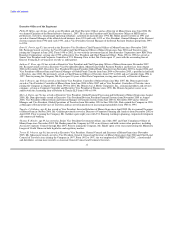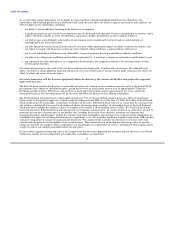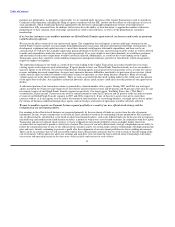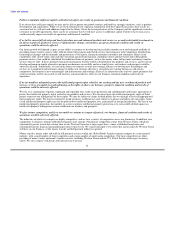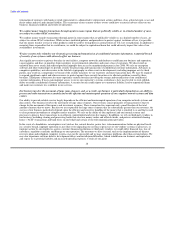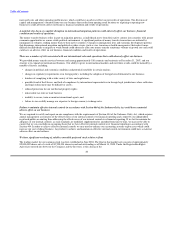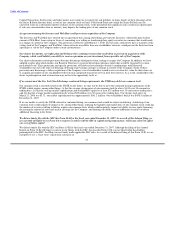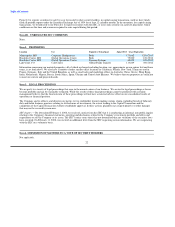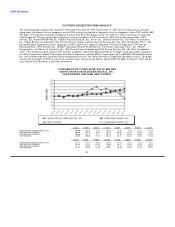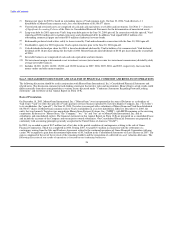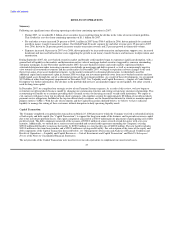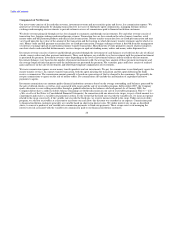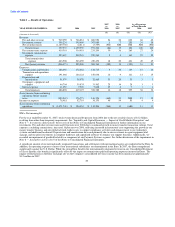MoneyGram 2007 Annual Report Download - page 23
Download and view the complete annual report
Please find page 23 of the 2007 MoneyGram annual report below. You can navigate through the pages in the report by either clicking on the pages listed below, or by using the keyword search tool below to find specific information within the annual report.
Table of Contents
increased costs and other operating inefficiencies, which could have an adverse effect on our results of operations. The diversion of
capital and management's attention from our core business that results from opening retail locations or acquiring or opening new
businesses could adversely affect our business, financial condition and results of operations.
A material slow down or complete disruption in international migration patterns could adversely affect our business, financial
condition and results of operations.
The money transfer business relies in part on migration patterns, as individuals move from their native country into countries with greater
economic opportunities or a more stable political environment. A significant portion of money transfer transactions are initiated by
immigrants or refugees sending money back to their native countries. Changes in immigration laws and economic development patterns
that discourage international migration and political or other events (such as war, terrorism or health emergencies) that make it more
difficult for individuals to migrate or work abroad could adversely affect our money transfer remittance volume or growth rate and could
each have an adverse effect on our business, financial condition and results of operations.
There are a number of risks associated with our international sales and operations that could adversely affect our business.
We provided money transfer services between and among approximately 180 countries and territories at December 31, 2007, and our
strategy is to expand our international business. Our ability to grow in international markets and our future results could be harmed by a
number of factors, including:
• changes in political and economic conditions and potential instability in certain regions;
• changes in regulatory requirements or in foreign policy, including the adoption of foreign laws detrimental to our business;
• burdens of complying with a wide variety of laws and regulations;
• possible fraud of theft losses, and lack of compliance by international representatives in foreign legal jurisdictions where collection
and legal enforcement may be difficult or costly;
• reduced protection for our intellectual property rights;
• unfavorable tax rules or trade barriers;
• inability to secure, train or monitor international agents; and
• failure to successfully manage our exposure to foreign currency exchange rates.
Failure to maintain effective internal controls in accordance with Section 404 of the Sarbanes-Oxley Act could have a material
adverse effect on our business.
We are required to certify and report on our compliance with the requirements of Section 404 of the Sarbanes-Oxley Act, which requires
annual management assessments of the effectiveness of our internal control over financial reporting and a report by our independent
registered public accounting firm addressing the effectiveness of our internal control over financial reporting. If we fail to maintain the
adequacy of our internal controls, as such standards are modified, supplemented or amended from time to time, we may not be able to
ensure that we can conclude on an ongoing basis that we have effective internal controls over financial reporting in accordance with
Section 404. In order to achieve effective internal controls we may need to enhance our accounting systems or processes which could
increase our cost of doing business. Any failure to achieve and maintain an effective internal control environment could have a material
adverse effect on our business.
We have significant overhang of salable convertible preferred stock relative to float.
The trading market for our common stock was first established in June 2004. The float in that market now consists of approximately
82,000,000 shares out of a total of 82,598,034 shares issued and outstanding as of March 14, 2008. Under the Registration Rights
Agreement entered into between the Company and the Investors at the closing of the
20



